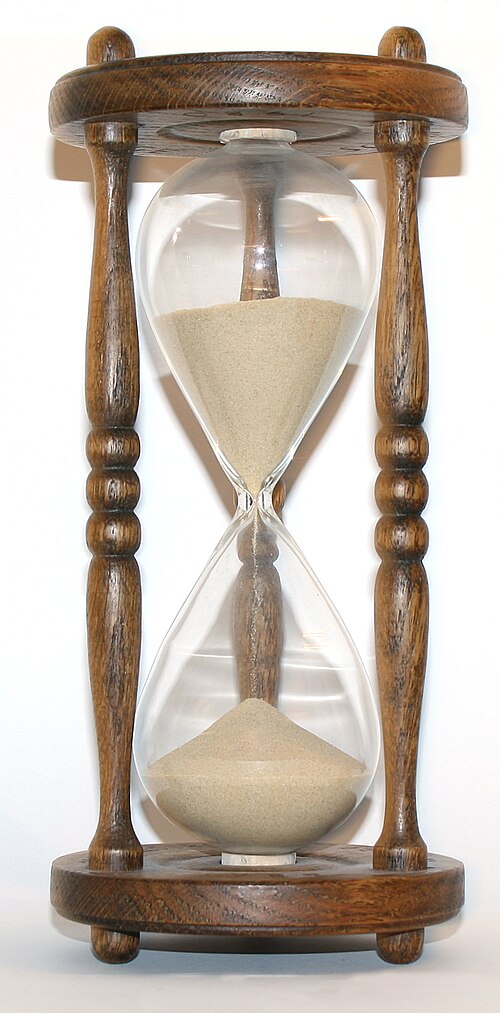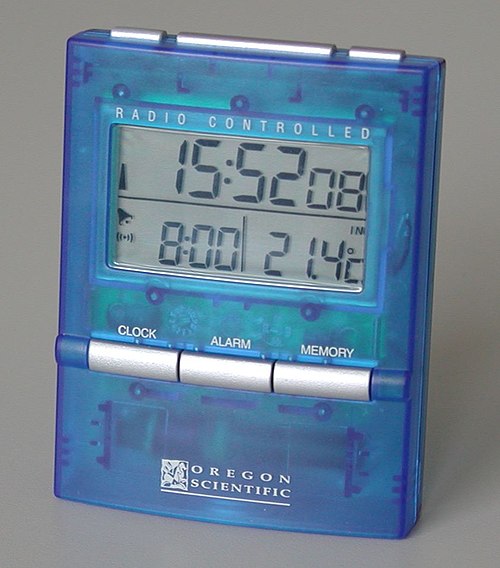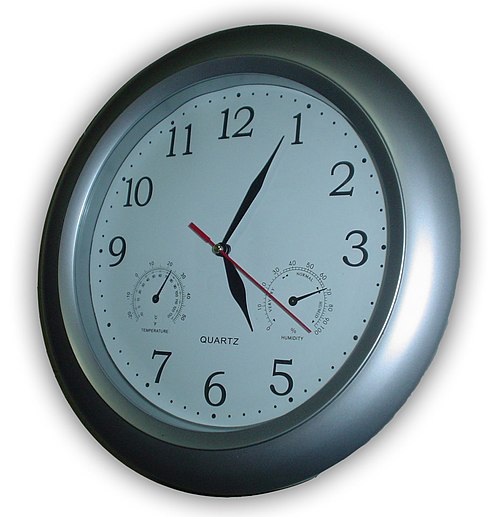Clocknoun
An instrument used to measure or keep track of time; a non-portable timepiece.
Clocknoun
(British) The odometer of a motor vehicle.
Clocknoun
(electronics) An electrical signal that synchronizes timing among digital circuits of semiconductor chips or modules.
Clocknoun
The seed head of a dandelion.
Clocknoun
A time clock.
Clocknoun
A CPU clock cycle, or T-state.
Clocknoun
A pattern near the heel of a sock or stocking.
Clockverb
(transitive) To measure the duration of.
Clockverb
(transitive) To measure the speed of.
Clockverb
To hit (someone) heavily.
Clockverb
(slang) To take notice of; to realise; to recognize someone or something
Clockverb
To falsify the reading of the odometer of a vehicle.
Clockverb
To beat a video game.
Clockverb
(transitive) To ornament (e.g. the side of a stocking) with figured work.
Clockverb
To make the sound of a hen; to cluck.
Clockverb
To hatch.
Clocknoun
A machine for measuring time, indicating the hour and other divisions; in ordinary mechanical clocks for domestic or office use the time is indicated on a typically circular face or dial plate containing two hands, pointing to numbers engraved on the periphery of the face, thus showing the hours and minutes. The works of a mechanical clock are moved by a weight or a spring, and it is often so constructed as to tell the hour by the stroke of a hammer on a bell. In electrical or electronic clocks, the time may be indicated, as on a mechanical clock, by hands, but may also be indicated by direct digital readout, with the hours and minutes in normal Arabic numerals. The readout using hands is often called analog to distinguish it from the digital readout. Some clocks also indicate the seconds. Clocks are not adapted, like the watch, to be carried on the person. Specialized clocks, such as atomic clocks, may be constructed on different principles, and may have a very high precision for use in scientific observations.
Clocknoun
A watch, esp. one that strikes.
Clocknoun
The striking of a clock.
Clocknoun
A figure or figured work on the ankle or side of a stocking.
Clocknoun
A large beetle, esp. the European dung beetle (Scarabæus stercorarius).
Clockverb
To ornament with figured work, as the side of a stocking.
Clockverb
To call, as a hen. See Cluck.
Clocknoun
a timepiece that shows the time of day
Clockverb
measure the time or duration of an event or action or the person who performs an action in a certain period of time;
Clock
A clock is a device used to measure, verify, keep, and indicate time. The clock is one of the oldest human inventions, meeting the need to measure intervals of time shorter than the natural units: the day, the lunar month, and the year.
Timenoun
(uncountable) The inevitable progression into the future with the passing of present events into the past.
Timenoun
A dimension of spacetime with the opposite metric signature to space dimensions; the fourth dimension.
Timenoun
Change associated with the second law of thermodynamics; the physical and psychological result of increasing entropy.
Timenoun
The property of a system which allows it to have more than one distinct configuration.
Timenoun
A duration of time.
Timenoun
(uncountable) A quantity of availability of duration.
Timenoun
(countable) A measurement of a quantity of time; a numerical or general indication of a length of progression.
Timenoun
The serving of a prison sentence.
Timenoun
(countable) An experience.
Timenoun
(countable) An era; (with the, sometimes in plural) the current era, the current state of affairs.
Timenoun
A person's youth or young adulthood, as opposed to the present day.
Timenoun
Time out; temporary, limited suspension of play.
Timenoun
An instant of time.
Timenoun
(uncountable) How much of a day has passed; the moment, as indicated by a clock or similar device.
Timenoun
(countable) A particular moment or hour; the appropriate moment or hour for something (especially with prepositional phrase or imperfect subjunctive).
Timenoun
(countable) A numerical indication of a particular moment.
Timenoun
(countable) An instance or occurrence.
Timenoun
Closing time.
Timenoun
The hour of childbirth.
Timenoun
(as someone's time) The end of someone's life, conceived by the speaker as having been predestined.
Timenoun
(countable) The measurement under some system of region of day or moment.
Timenoun
(countable) Ratio of comparison.
Timenoun
Tense.
Timenoun
(music) The measured duration of sounds; measure; tempo; rate of movement; rhythmical division.
Timeverb
To measure or record the time, duration, or rate of.
Timeverb
To choose when something begins or how long it lasts.
Timeverb
(obsolete) To keep or beat time; to proceed or move in time.
Timeverb
(obsolete) To pass time; to delay.
Timeverb
To regulate as to time; to accompany, or agree with, in time of movement.
Timeverb
To measure, as in music or harmony.
Timeinterjection
(tennis) Reminder by the umpire for the players to continue playing after their pause.
Timenoun
Duration, considered independently of any system of measurement or any employment of terms which designate limited portions thereof.
Timenoun
A particular period or part of duration, whether past, present, or future; a point or portion of duration; as, the time was, or has been; the time is, or will be.
Timenoun
The period at which any definite event occurred, or person lived; age; period; era; as, the Spanish Armada was destroyed in the time of Queen Elizabeth; - often in the plural; as, ancient times; modern times.
Timenoun
The duration of one's life; the hours and days which a person has at his disposal.
Timenoun
A proper time; a season; an opportunity.
Timenoun
Hour of travail, delivery, or parturition.
Timenoun
Performance or occurrence of an action or event, considered with reference to repetition; addition of a number to itself; repetition; as, to double cloth four times; four times four, or sixteen.
Timenoun
The present life; existence in this world as contrasted with immortal life; definite, as contrasted with infinite, duration.
Timenoun
Tense.
Timenoun
The measured duration of sounds; measure; tempo; rate of movement; rhythmical division; as, common or triple time; the musician keeps good time.
Timeverb
To appoint the time for; to bring, begin, or perform at the proper season or time; as, he timed his appearance rightly.
Timeverb
To regulate as to time; to accompany, or agree with, in time of movement.
Timeverb
To ascertain or record the time, duration, or rate of; as, to time the speed of horses, or hours for workmen.
Timeverb
To measure, as in music or harmony.
Timeverb
To keep or beat time; to proceed or move in time.
Timeverb
To pass time; to delay.
Timenoun
an instance or single occasion for some event;
Timenoun
an indefinite period (usually marked by specific attributes or activities);
Timenoun
a period of time considered as a resource under your control and sufficient to accomplish something;
Timenoun
a suitable moment;
Timenoun
the continuum of experience in which events pass from the future through the present to the past
Timenoun
the time as given by a clock;
Timenoun
the fourth coordinate that is required (along with three spatial dimensions) to specify a physical event
Timenoun
a person's experience on a particular occasion;
Timenoun
rhythm as given by division into parts of equal time
Timenoun
the period of time a prisoner is imprisoned;
Timeverb
measure the time or duration of an event or action or the person who performs an action in a certain period of time;
Timeverb
assign a time for an activity or event;
Timeverb
set the speed, duration, or execution of;
Timeverb
regulate or set the time of;
Timeverb
adjust so that a force is applied an an action occurs at the desired time;
Timenoun
the indefinite continued progress of existence and events in the past, present, and future regarded as a whole
Timenoun
the continued progress of existence as affecting people and things
Timenoun
time or an amount of time as reckoned by a conventional standard
Timenoun
the personification of time, typically as an old man with a scythe and hourglass.
Timenoun
a point of time as measured in hours and minutes past midnight or noon
Timenoun
a moment or definite portion of time allotted, used, or suitable for a purpose
Timenoun
the favourable or appropriate time to do something
Timenoun
an indefinite period
Timenoun
a portion of time in history or characterized by particular events or circumstances
Timenoun
the conditions of life during a particular period
Timenoun
used in names of newspapers
Timenoun
one's lifetime
Timenoun
the successful, fortunate, or influential part of a person's life or career
Timenoun
the appropriate or expected time for something, in particular childbirth or death
Timenoun
an apprenticeship
Timenoun
a period of menstruation or pregnancy.
Timenoun
the normal rate of pay for time spent working
Timenoun
the length of time taken to run a race or complete an event or journey
Timenoun
the moment at which the opening hours of a pub end
Timenoun
short for "full time"
Timenoun
a moment at which play stops temporarily within a game
Timenoun
time as allotted, available, or used
Timenoun
a prison sentence
Timenoun
an instance of something happening or being done; an occasion
Timenoun
an event, occasion, or period experienced in a particular way
Timenoun
(following a number) expressing multiplication
Timenoun
the rhythmic pattern of a piece of music, as expressed by a time signature
Timenoun
the tempo at which a piece of music is played or marked to be played.
Timeverb
plan, schedule, or arrange when (something) should happen or be done
Timeverb
perform (an action) at a particular moment
Timeverb
measure the time taken by (a process or activity, or a person doing it)
Timeverb
(of a computer or a program) cancel an operation automatically because a predefined interval of time has passed without a certain event happening
Timeverb
(of an operation) be cancelled automatically because a predefined interval of time has passed without a certain event happening.
Time
Time is the continued sequence of existence and events that occurs in an apparently irreversible succession from the past, through the present, into the future. It is a component quantity of various measurements used to sequence events, to compare the duration of events or the intervals between them, and to quantify rates of change of quantities in material reality or in the conscious experience.










































